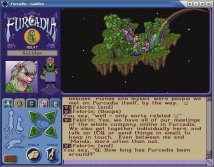|
Interview with Dragon's Eye Productions
 The Independent Games Festival was established in 1998 as a forum for independent developers to exhibit their work, receive recognition, and meet with commercial publishers. Finalists to this event attend the GDC and compete for several awards and cash prizes. This year¹s Seumas McNally grand prize is $15,000.
The Independent Games Festival was established in 1998 as a forum for independent developers to exhibit their work, receive recognition, and meet with commercial publishers. Finalists to this event attend the GDC and compete for several awards and cash prizes. This year¹s Seumas McNally grand prize is $15,000.
This interview I got to sit down with the Producer and All-Around Guy of Dragon's Eye Productions… literally. More specifically, we were sitting on an island floating in the void of space. It was a "dream" in the world of Furcadia. Holding the interview in the game itself I thought was rather interesting and sparked wonderful conversation about a massively online fantasy game that has been around for many years.
 Q: Who are you and what do you do?
Q: Who are you and what do you do?
|
 Q: Are you all located locally?
Q: Are you all located locally?
|
 Q: Do you guys meet to discuss stuff on Furcadia itself?
Q: Do you guys meet to discuss stuff on Furcadia itself?
|
 Q: How long has Furcadia been around?
Q: How long has Furcadia been around?
|
 Q: When did the gameplay idea come about?
Q: When did the gameplay idea come about?
|
 Q: Of all the IGF entries, this is probably the largest in terms of longevity. What made you go at it independently?
Q: Of all the IGF entries, this is probably the largest in terms of longevity. What made you go at it independently?
|
 Q: So was there anything remotely like this when it first came out?
Q: So was there anything remotely like this when it first came out?
|
 Q: $50,000 is another big number for an indie title - where did most of the funding come from?
Q: $50,000 is another big number for an indie title - where did most of the funding come from?
|
 Q: You can obviously do a lot on Furcadia. What are some of the major goings on?
Q: You can obviously do a lot on Furcadia. What are some of the major goings on?
|
 Q: And all this is made possible with DragonSpeak? What is DragonSpeak?
Q: And all this is made possible with DragonSpeak? What is DragonSpeak?
|
 Q: What was Furcadia itself developed with?
Q: What was Furcadia itself developed with?
|
 Q: How has the game changed over the years as technology advanced?
Q: How has the game changed over the years as technology advanced?
|
 Q: What made you enter Furcadia into the IGF?
Q: What made you enter Furcadia into the IGF?
|
 Q: Emerald Flame, Felorin, thanks for taking the time to do this interview. See you at the GDC!
Q: Emerald Flame, Felorin, thanks for taking the time to do this interview. See you at the GDC!
|
Interview conducted by Drew "Gaiiden" Sikora.
Click here to post your comments in the forums
|